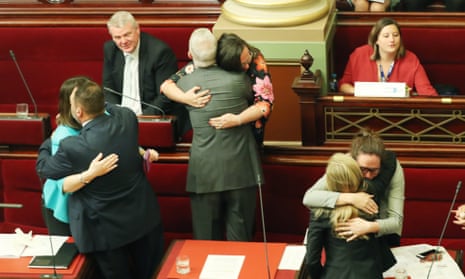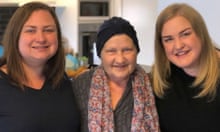In the early hours of Tuesday 25 March 1997, the Australian Senate overturned the world’s first voluntary euthanasia law by just three votes.
Public reaction to the disallowance of the Northern Territory’s 1995 laws was furious, talkback radio inundated with callers angry that politicians, strong-armed by churches, were so out of touch with public opinion. A letter writer to the Sydney Morning Herald wished a key opponent of the NT’s scheme, the then little-known Victorian MP Kevin Andrews, “a long and excruciatingly painful life”.
Emotion was so strong that it was assumed by supporters of voluntary euthanasia – now usually called “assisted dying” – that states would quickly pass laws of their own to allow for terminally ill people to choose help to die. The federal parliament has no power to overturn state euthanasia laws while it does have power to intervene in Territory legislation.
The state most likely was Victoria. The then premier Jeff Kennett was a supporter, once calling voluntary euthanasia a “beautiful thing”. Kennett flirted with it but it was hardly a priority, and there was always a sense that it was dangerous political territory.
The optimism was misplaced. It has taken 20 years – and more than 50 failed attempts in parliaments across the country – before the most progressive state in the nation has taken that step.
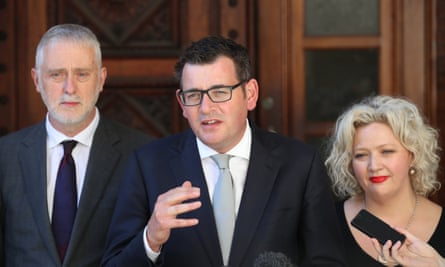
It took until Wednesday at 4.10pm, more than five weeks since the lower house began debating the Voluntary Assisted Dying bill for the law to pass the upper house after a brutal 28-hour sitting.
It was never a sure thing. The government wanted no amendments to its carefully constructed law but was forced to horse-trade with waverers in the upper house to ensure passage. Those amendments will need to be ratified in the lower house, but that is a formality and is likely to be done next week.
There are crucial reasons why Victoria was able to pass a such a contentious law, one that always raises the deepest tensions between the rights of individuals to autonomy and the rights of the broader society to weigh the consequences. An opponent, the former prime minister Paul Keating, called Victoria’s law a “threshold moment for the country”, a threshold that has been crossed.
There have been profound social changes over two decades, and greater demand from people – especially baby boomers – to have control of their deaths as well as their lives. There are parallels with the other conscience issue of the moment – same-sex marriage. The issues are different – there will be no street parties to celebrate assisted dying – but both have strong public support and have faced determined political resistance. Religious hierarchies have played a role in both.
“Sometimes the stars align,” says Fiona Patten, an upper house MP from the Reason party (formerly the Sex party) who announced when she was elected in 2014 that her first priority was to set up an inquiry into assisted dying. The government made a decision to control the process and Patten was part of a committee into end-of-life care that reported last year.
The last of its 49 recommendations was that Victoria should pass assisted dying laws. “If you look at the process that we have followed here, it has never been followed before,” Patten says.
Assisted dying advocate Andrew Denton says that while the Victorian scheme had many architects, Brian Owler was the engineer. Owler, a brain surgeon and a former Australian Medical Association federal president, chaired a ministerial advisory panel that detailed how a law would work.
“The most important thing was that this was a government-sponsored process and that’s the first time that’s happened,” he said. All other Australian attempts have been hopeful private members’ bills, lacking the resources and authority of government.
Denton had major heart surgery a few months ago but has continued to campaign. He sat with Owler in the public gallery through Tuesday night’s debate, nervous until the end. The law is “a game changer” for Australia, he says.
“If you do the process right, then you have a properly informed debate, and when the facts are on the table it’s much harder to do the ‘ooggity boogity’ of fear, uncertainty and doubt and just keep trotting out the mantras about vulnerable people and suggesting that doctors are going to go off killing people. It doesn’t work once the evidence is there.”
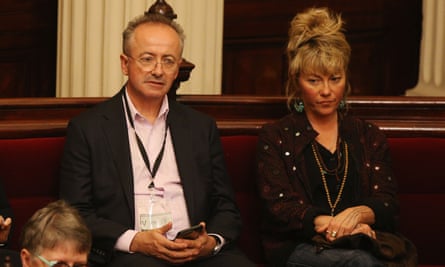
For such historic legislation, perhaps it was fitting that its passage was such a scrap, an endurance exercise, after some of the most emotional speeches parliament has heard.
Opponents had profound objections to the principle of the state endorsing suicide, even if the intention is compassionate. They seemed unable to accept that the Rubicon, as they often put it, was about to be crossed.
So they stayed on their feet. They did all they could, putting motions to shut debate down, repeating the same questions again and again, going deeper and deeper down rabbit holes. Could prisoners use the scheme? (yes) Would the locked box where the drugs were to be kept before use be “a flimsy box, a petty-cash tin” or a safe, wondered Liberal Wendy Lovell. Would the person have to purchase the locked box themselves or would the government provide it? Where on earth would prisoners store the locked box?
They just kept talking. During last week’s upper house sittings, debate over the first clause alone in the 141-clause bill took 12 hours before the government “gagged” it, bringing on a vote. On Friday morning, after another all-night sitting, a Labor MP collapsed in his office and was taken to hospital.
It got ugly. Christian conservative Bernie Finn said the government would be responsible for “setting up the death industry in Australia”. He read out an almost 2,000-word article by a woman who claims to be a psychic medium and criminal profiler. It included: “Remember that the Nazis went after the disabled. Then they moved to the non-disabled, lest you think that you could never be on the chopping block.” Liberal Inga Peulich was provocative. “I do not consider voluntary assisted dying to be medical treatment. It is a final solution.”
Special minister of state Gavin Jennings sauntered around the chamber, a cool overseer answering question after question, only occasionally showing his frustration: “I have spent hours in answering repetitive questions, listening to repetitive contributions, set speeches that cover a lot of ground that we have actually covered.”
Politicians were exhausted, some forgetting which clauses and amendments had been dealt with. But delay could be sustained only so long. The bill passed 22 to 18 on a conscience vote, with four Liberal MPs proving crucial to the result.
With some justification, the government claims this will be the most conservative regime in the world. Too conservative? Too cumbersome? Patten thinks so. “I’m fearful that it is so conservative, what we will see is that Victoria will lead the way and then be the followers for the rest of the way.”
There are many hoops. You have to be an adult with decision-making capacity. You have to be an “ordinary resident of Victoria” for at least 12 months. You have to have an incurable illness or condition that will cause death and have a life expectancy of less than six months (or 12 months if the patient is suffering a neurodegenerative illness such as motor neuron disease). You have to be experiencing suffering that cannot be relieved in a way that is tolerable to you.
You have to make three requests to access the scheme, including a written request. A doctor is prohibited from raising assisted dying with you – you must discuss it first. You have to be assessed by two experienced doctors, one of whom is a specialist, who will determine your eligibility.
You will be prescribed drugs that you will take at a time of your choosing, unless you are physically incapable of injecting the drugs, in which case a lethal injection can be administered. You have to keep the drugs in a “locked box” before use. And so it goes.
The law comes into operation in June 2019. A new statutory Voluntary Assisted Dying Review Board will be set up to oversee compliance and report to parliament. The next state election is due in November next year and already opponents are saying they will campaign to have the law repealed before it ever commences.
As cautious as it is, supporters of assisted suicide are amazed at what they have achieved.
“I am still pinching myself,” Patten says. She gives credit to Premier Daniel Andrews, a Catholic, who changed his mind on assisted dying after his father, Bob, died of cancer last year. “This couldn’t have been done without the premier’s support.”
Andrews’ voice broke as he told parliament last month that “only when you have seen someone you love succumb feebly and painfully to what some people might even describe as a good death, do you start to think about what on earth must qualify as a bad death”.
It was one of many speeches that revealed human vulnerability, a rare sight in parliament. Labor MP Jaala Pulford spoke of the death of her “beautiful, brilliant, vivacious, unicycle-mad daughter Sinead” from cancer, aged 13.
Harriet Shing talked about the death of her brother Patrick from cancer at the age of 42. “Prostate cancer loves bone. It loves bone in a way that fire loves kindling. And my brother was eaten by this cancer.”
Opponents focused on what the shift would mean in a culture that espouses the value of each human life. Labor MP Daniel Mulino, who wrote a dissenting report to the parliamentary committee’s inquiry, said that “with this bill we would potentially take the first step on a longer journey where the values of society and the medical profession will be recast to include the right to die in an ever wider range of circumstances, and the organising principle will be personal choice, not the value of human life.”
Personal experiences are one reason why public support for assisted dying for terminally ill adults has always been as high as 80%, depending on how the question is asked.
But the medical establishment has always opposed it, saying it breaches a fundamental medical ethic to do no harm and that increasingly, good palliative care can ease almost all pain and physical suffering.
The Australian Medical Association, the peak professional body for doctors, opposed the Victorian bill. Yet its subtle shift in position reflects a growing diversity of views among doctors. The Royal Australian College of General Practitioners supported Victoria’s law, as did the Australian Medical Students’ Association.
The Victorian branch of the AMA did not campaign against the law, although several past presidents did. Its position was the formal AMA policy that consideration of assisted dying was “ultimately a matter for society and government”. It worked with Owler’s committee to ensure its members were protected if, for instance, they chose not to participate.
The state president, Dr Lorraine Baker, noted that assisted dying would be a “significant shift in medical practice in Victoria” and that the AMA would now work to ensure implementation was robust and safe.
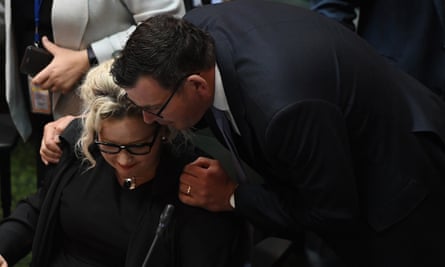
Also shifting was the influence of established churches, which played a crucial role in overturning the Northern Territory’s law and have campaigned against every attempt since. The Australian Christian Lobby’s Dan Flynn lobbied MPs hard. But the national president, Lyle Shelton, was preoccupied with same-sex marriage, although he came to Melbourne to witness some of the upper house debate.
Owler says religious leaders, especially from the Catholic and Anglican faiths, were “very active behind the scenes”, meeting with MPs and preaching to congregations.
“The significant thing is that over the past few years in particular the influence of religious leaders has waned, and that’s meant that the statements from bishops and other leaders haven’t had the same influence on the members of their own church, let alone other people.”
Denton says religion is “always behind the scenes – you scratch the surface of 95% of people who oppose this and you’ll find the church there, and most often the Catholic church”.
Palliative care organisations have a faith-based history too, and many in Victoria are linked to the Catholic church. But they have real fears that assisted dying will begin to be seen as an extension of palliative care.
Palliative Care Victoria was perhaps the most effective opponent, pointing out the lack of access to palliative care, particularly in regional and rural Victoria. In the past few days the government, mindful of the power of those arguments, announced a $62m boost to palliative care over five years, and a review of palliative care access.
Owler says when the state’s health minister, Jill Hennessy, asked him to chair her ministerial panel, it was far from clear that a bill would pass. His own views have evolved. “I didn’t come to this with the blindness of someone who thought we must have this legislation at all costs. I made that pretty clear along the way, that this wasn’t going to be a process of the panel ticking the box.”
What Owler’s panel could do was look at the schemes operating overseas, and examine the evidence about how they worked. That experience too was lacking when the Northern Territory’s law was passed in 1995.
Victoria will join jurisdictions including five American states, Canada, Netherlands, Belgium and Switzerland. Victoria’s scheme is unique but is modelled on Oregon, which has had assisted dying laws for 20 years.
Opponents focused on the “slippery slope”, the idea that it is inevitable for once-tight laws to loosen and to be abused. They particularly cited Belgium and the Netherlands, which have much more liberal schemes than Victoria is proposing – a person does not have to be terminally ill, for instance, to access those laws, and in Belgium in rare cases “competent minors” may seek access.
The normal practice there, too, is for a doctor to administer a lethal injection – so-called voluntary euthanasia. In the American states, a patient must take the drugs themselves – known as assisted dying. Victoria is an assisted dying scheme in all but exceptional cases.
None of the laws of the American states has been liberalised, although there have been some attempts.
“The arguments around slippery slope, they just don’t stack up,” says Owler. “Things around coercion and elder abuse, you can see how that’s a concern, but the evidence again from the medical literature is there’s no evidence that that has been an issue in jurisdictions like Oregon.”
Owler is convinced Victoria’s laws will prove historic and influential.
“We are all aware of the legislation in the NT, but even so this will have impacts on the rest of the country.”
Marshall Perron, the former chief minister of the Northern Territory, was the person who made those laws possible – they were his idea, and he personally drove them through the NT parliament. He has campaigned for assisted dying around the country ever since, and travelled to Melbourne to witness some of the parliamentary debate.
But when the voluntary assisted dying bill passed the upper house, Perron, now 75, was at home in Buderim in Queensland. He watched Victoria cross the threshold with bittersweet feelings.
“Bitter because in the period since the NT law was vetoed probably 2,000 or so people have died awfully who would have taken the option it allowed them, and many more would have benefited from simply knowing the option was there,” he said.
“Sweet because the action in Victoria vindicated what the Territory parliament did 22 years ago. Back then some, not the majority, thought we were outrageously irresponsible and had to be brought to heel. And we were.”
The big difference this time is that Victoria will not be brought to heel.
